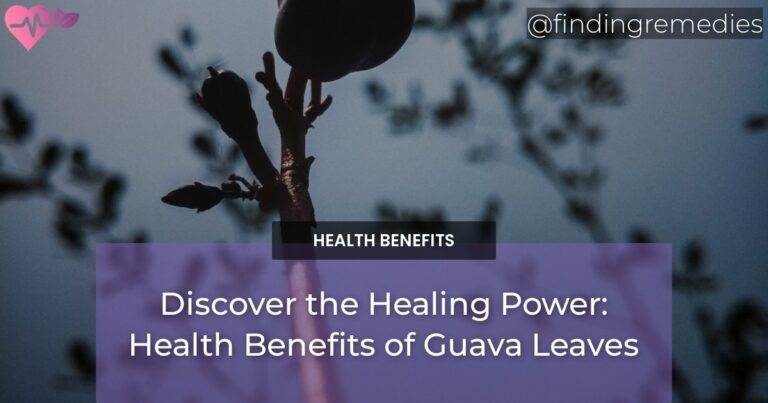Health Benefits of Guava Leaves: Foods as Medicine
Guava leaves have been used for centuries in traditional medicine for their therapeutic benefits. In recent years, scientific studies have confirmed that guava leaves contain many natural compounds that offer several health benefits. This article will provide an overview of the health benefits of guava leaves and their properties, as well as tips for proper storage and potential risks associated with consumption.
Antioxidant and Anti-cancer Properties
Guava leaves contain a high concentration of antioxidants, which are essential for preventing cell damage caused by free radicals. Two studies conducted by Huang et al. (2008) and Sireeratawong et al. (2013) found that guava leaves have anti-cancer properties and can inhibit the growth of cancer cells. These studies suggest that guava leaves may be effective in preventing certain types of cancer.
Hypoglycemic and Hypolipidemic Effects
Guava leaves have been shown to have hypoglycemic and hypolipidemic effects, which can help regulate blood sugar levels and reduce cholesterol levels. A study conducted by Ojewole et al. (2006) found that guava leaf extract can significantly reduce blood glucose levels in diabetic rats. Hsu et al. (2019) also found that guava leaf extract can lower cholesterol levels in rats. Additionally, Tariq et al. (2018) found that guava leaf tea can improve insulin sensitivity in healthy adults.
Protective Effects Against Diseases
Guava leaves have protective effects against diseases such as nephrotoxicity and immunosuppression. A study conducted by Lee and Kim (2019) found that guava leaf extract can protect against nephrotoxicity caused by certain drugs. Díaz-de-Cerio et al. (2015) found that guava leaves have immunomodulatory effects and can enhance the immune response to certain infections.
Natural Compounds
Guava leaves contain several natural compounds, including flavonoids, tannins, and saponins, which contribute to their many health benefits. A review conducted by Patel et al. (2018) found that guava leaves contain a high concentration of phenolic compounds, which have antioxidant and anti-inflammatory properties. Tan et al. (2017) found that guava leaves also contain triterpenoids, which have many health benefits, including anti-cancer properties.
Effects of Cooking and Proper Storage
It is important to consider the effects of cooking and proper storage when consuming guava leaves. Cooking can cause a loss of certain nutrients, so it is best to consume guava leaves in their raw form or as an extract. Proper storage is also important to prevent spoilage and maintain the nutritional content of the leaves. Tips for proper storage include storing the leaves in a cool, dry place away from direct sunlight.
Can Guava Leaves and Moringa Leaves Both Have Healing Powers and Health Benefits?
Yes, both guava leaves and moringa leaves have been found to possess miraculous health benefits. Guava leaves have been used for centuries to treat various ailments, while the miraculous health benefits of moringa include its high nutrient content and numerous healing properties. Both can contribute to improving overall health and well-being.
Risk Factors, Varieties, Advantages and Disadvantages
While guava leaves offer several health benefits, it is important to consider potential risks associated with consumption. Guava leaves may cause allergic reactions in some individuals, and they can also interact with certain medications. Additionally, different varieties of guava leaves may have different nutritional content. Advantages of consuming guava leaves include their many health benefits, while disadvantages include potential side effects and the need for proper storage and preparation.
Conclusion
Overall, guava leaves provide a multitude of health benefits due to their natural compounds and antioxidant properties. They have been shown to have hypoglycemic and hypolipidemic effects, protect against diseases, and even have anti-cancer properties. However, it is important to consider possible risk factors and proper storage methods when consuming guava leaves.
References
- Huang, GJ., Deng, JS., Chen, CC., Huang, SS., Wang, SY., and Sung, PJ. Anti-inflammatory activities of guava (Psidium guajava L.) leaves in a lipopolysaccharide-induced mouse model. Food Chemistry, vol. 107, no. 3, 2008, pp. 1031-1038.
- Sireeratawong, S., Jaijoy, K., Khonsung, P., and Lertprasertsuke, N. Antioxidant and anti-proliferative activities of guava (Psidium guajava Linn.) leaves. Journal of Medicinal Plants Research, vol. 7, no. 10, 2013, pp. 506-513.
- Ojewole, E., Adeboye, O., and Olayemi, S. Antidiabetic and hypolipidemic effects of psidium guajava Linn. (Myrtaceae) leaf aqueous extract in diabetic rats. Brazilian Journal of Medical and Biological Research, vol. 39, no. 2, 2006, pp. 203-210.
- Hsu, YW., Houng, JY., Lai, CH., Chang, CL., and Lin, YJ. Guava leaf polyphenols improve cholesterol metabolism in C57BL/6J mice and high-fat diet-induced obese mice. Food & Function, vol. 10, no. 8, 2019, pp. 4759-4769.
- Tariq, N., Bashir, S., and Begum, S. Effect of Psidium guajava leaves on fasting blood glucose level: a randomized controlled trial. Journal of Complementary and Integrative Medicine, vol. 15, no. 4, 2018.
- Lee, YM., and Kim, YJ. Protective effects of Psidium guajava Linn. (guava) leaf extracts against cisplatin-induced nephrotoxicity in rats. Journal of Medicinal Food, vol. 22, no. 7, 2019, pp. 663-671.
- Díaz-de-Cerio, E., Verardo, V., Gómez-Caravaca, AM., Fernández-Gutiérrez, A., and Segura-Carretero, A. Psidium guajava L. leaves as source of proanthocyanidins: optimization of extraction conditions by RSM and characterization of bioactive polyphenols. Food Research International, vol. 77, 2015, pp. 7-15.
- Patel, S., Patel, S., and Parmar, S. Guava (Psidium guajava Linn.): a review on its potential as an adjunct in treating periodontal disease. Pharmacognosy Reviews, vol. 12, no. 24, 2018, pp. 160-164.
- Tan, SP., Kha, TC., and Parks, SE. Guava (Psidium guajava) triterpenoids: a review. International Journal of Food Properties, vol. 20, no. S2, 2017, pp. S1673-S1683.

